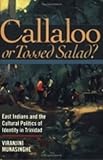Callaloo or Tossed Salad? : East Indians and the Cultural Politics of Identity in Trinidad / Viranjini P. Munasinghe.
Material type: TextPublisher: Ithaca, NY : Cornell University Press, [2018]Copyright date: ©2001Description: 1 online resource (336 p.) : 4 maps, 2 line drawings, 3 tablesContent type:
TextPublisher: Ithaca, NY : Cornell University Press, [2018]Copyright date: ©2001Description: 1 online resource (336 p.) : 4 maps, 2 line drawings, 3 tablesContent type: - 9781501729041
- 305.891/4072983 21
- online - DeGruyter
| Item type | Current library | Call number | URL | Status | Notes | Barcode | |
|---|---|---|---|---|---|---|---|
 eBook
eBook
|
Biblioteca "Angelicum" Pont. Univ. S.Tommaso d'Aquino Nuvola online | online - DeGruyter (Browse shelf(Opens below)) | Online access | Not for loan (Accesso limitato) | Accesso per gli utenti autorizzati / Access for authorized users | (dgr)9781501729041 |
Frontmatter -- Contents -- Preface -- [1] Introduction -- [2] Ethnicity and Nation -- [3] Foretelling Ethnicity: East Indians between Ex-Slaves and Planters -- [4] Situating Ethnicity: East Indians against the Nation -- [5] To Be Ethnic in a Place in Between -- [6] To Be Mixed Up in a Place in Between -- [7] Nation Building within the State: Consolidating an Afro-Caribbean Nation -- [8] Breaking the Silence: The Disintegration of Hegemonic Rule -- [9] Redefining the National Image -- References -- Index
restricted access online access with authorization star
http://purl.org/coar/access_right/c_16ec
Callaloo or Tossed Salad? is a historical and ethnographic case study of the politics of cultural struggle between two traditionally subordinate ancestral groups in Trinidad, those claiming African and Indian descent. Viranjini Munasinghe argues that East Indians in Trinidad seek to become a legitimate part of the nation by redefining what it means to be Trinidadian, not by changing what it means to be Indian. In her view, Indo-Trinidadians' recent and ongoing struggle for national and cultural identity builds from dissatisfaction with the place they were originally assigned within Trinidadian society. The author examines how Indo-Trinidadian leaders in Trinidad have come to challenge the implicit claim that their ethnic identity is antithetical to their national identity. Their political and cultural strategy seeks to change the national image of Trinidad by introducing Indian elements alongside those of the dominant Afro-Caribbean (Creole) culture.Munasinghe analyzes a number of broad theoretical issues: the moral, political, and cultural dimensions of identity; the relation between ethnicity and the nation; and the possible autonomy of New World nationalisms from European forms. She details how principles of exclusion continue to operate in nationalist projects that celebrate ancestral diversity and multiculturalism. Drawing on the insights of theorists who use creolization to understand the emergence of Afro-American cultures, Munasinghe argues that Indo-Trinidadians can be considered Creole because they, like Afro-Trinidadians, are creators and not just bearers of culture.
Mode of access: Internet via World Wide Web.
In English.
Description based on online resource; title from PDF title page (publisher's Web site, viewed 26. Apr 2024)


